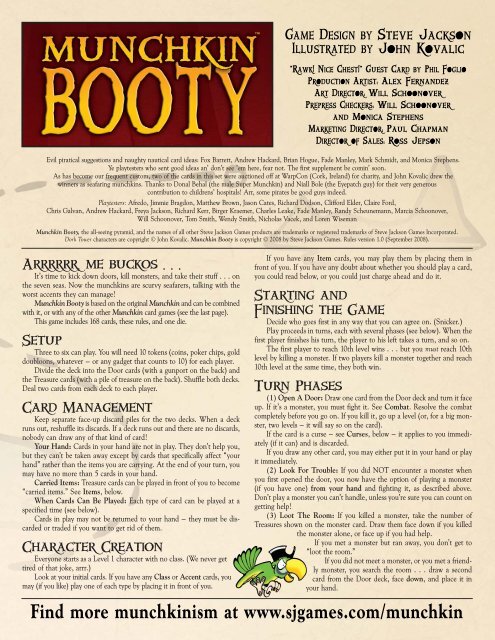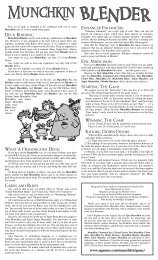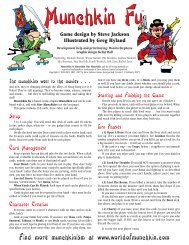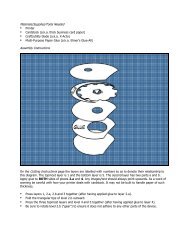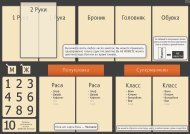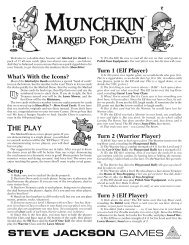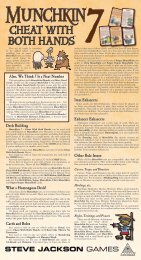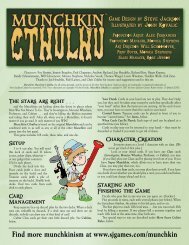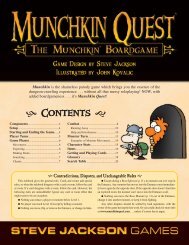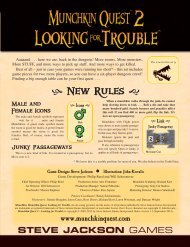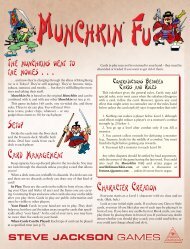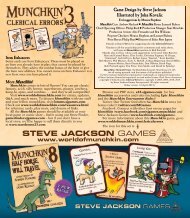MBooty-Rulesheet.qxd:Rulesheet template.qxd - Munchkin
MBooty-Rulesheet.qxd:Rulesheet template.qxd - Munchkin
MBooty-Rulesheet.qxd:Rulesheet template.qxd - Munchkin
Create successful ePaper yourself
Turn your PDF publications into a flip-book with our unique Google optimized e-Paper software.
GAME DESIGN BY STEVE JACKSON<br />
ILLUSTRATED BY JOHN KOVALIC<br />
“RAWK! NICE CHEST!” GUEST CARD BY PHIL FOGLIO<br />
PRODUCTION ARTIST: ALEX FERNANDEZ<br />
ART DIRECTOR: WILL SCHOONOVER<br />
PREPRESS CHECKERS: WILL SCHOONOVER<br />
AND MONICA STEPHENS<br />
MARKETING DIRECTOR: PAUL CHAPMAN<br />
DIRECTOR OF SALES: ROSS JEPSON<br />
Evil piratical suggestions and naughty nautical card ideas: Fox Barrett, Andrew Hackard, Brian Hogue, Fade Manley, Mark Schmidt, and Monica Stephens.<br />
Ye playtesters who sent good ideas an’ don’t see ’em here, fear not. The first supplement be comin’ soon.<br />
As has become our frequent custom, two of the cards in this set were auctioned off at WarpCon (Cork, Ireland) for charity, and John Kovalic drew the<br />
winners as seafaring munchkins. Thanks to Donal Behal (the male Super <strong>Munchkin</strong>) and Niall Bole (the Eyepatch guy) for their very generous<br />
contribution to childrens’ hospitals! Arr, some pirates be good guys indeed.<br />
Playtesters: Afredo, Jimmie Bragdon, Matthew Brown, Jason Cates, Richard Dodson, Clifford Elder, Claire Ford,<br />
Chris Galvan, Andrew Hackard, Freya Jackson, Richard Kerr, Birger Kraemer, Charles Leake, Fade Manley, Randy Scheunemann, Marcia Schoonover,<br />
Will Schoonover, Tom Smith, Wendy Smith, Nicholas Vacek, and Loren Wiseman<br />
<strong>Munchkin</strong> Booty, the all-seeing pyramid, and the names of all other Steve Jackson Games products are trademarks or registered trademarks of Steve Jackson Games Incorporated.<br />
Dork Tower characters are copyright © John Kovalic. <strong>Munchkin</strong> Booty is copyright © 2008 by Steve Jackson Games. Rules version 1.0 (September 2008).<br />
Arrrrrr, me buckos . . .<br />
It’s time to kick down doors, kill monsters, and take their stuff . . . on<br />
the seven seas. Now the munchkins are scurvy seafarers, talking with the<br />
worst accents they can manage!<br />
<strong>Munchkin</strong> Booty is based on the original <strong>Munchkin</strong> and can be combined<br />
with it, or with any of the other <strong>Munchkin</strong> card games (see the last page).<br />
This game includes 168 cards, these rules, and one die.<br />
Setup<br />
Three to six can play. You will need 10 tokens (coins, poker chips, gold<br />
doubloons, whatever – or any gadget that counts to 10) for each player.<br />
Divide the deck into the Door cards (with a gunport on the back) and<br />
the Treasure cards (with a pile of treasure on the back). Shuffle both decks.<br />
Deal two cards from each deck to each player.<br />
Card Management<br />
Keep separate face-up discard piles for the two decks. When a deck<br />
runs out, reshuffle its discards. If a deck runs out and there are no discards,<br />
nobody can draw any of that kind of card!<br />
Your Hand: Cards in your hand are not in play. They don’t help you,<br />
but they can’t be taken away except by cards that specifically affect “your<br />
hand” rather than the items you are carrying. At the end of your turn, you<br />
may have no more than 5 cards in your hand.<br />
Carried Items: Treasure cards can be played in front of you to become<br />
“carried items.” See Items, below.<br />
When Cards Can Be Played: Each type of card can be played at a<br />
specified time (see below).<br />
Cards in play may not be returned to your hand – they must be discarded<br />
or traded if you want to get rid of them.<br />
Character Creation<br />
Everyone starts as a Level 1 character with no class. (We never get<br />
tired of that joke, arrr.)<br />
Look at your initial cards. If you have any Class or Accent cards, you<br />
may (if you like) play one of each type by placing it in front of you.<br />
If you have any Item cards, you may play them by placing them in<br />
front of you. If you have any doubt about whether you should play a card,<br />
you could read below, or you could just charge ahead and do it.<br />
Starting and<br />
Finishing the Game<br />
Decide who goes first in any way that you can agree on. (Snicker.)<br />
Play proceeds in turns, each with several phases (see below). When the<br />
first player finishes his turn, the player to his left takes a turn, and so on.<br />
The first player to reach 10th level wins . . . but you must reach 10th<br />
level by killing a monster. If two players kill a monster together and reach<br />
10th level at the same time, they both win.<br />
Turn Phases<br />
(1) Open A Door: Draw one card from the Door deck and turn it face<br />
up. If it’s a monster, you must fight it. See Combat. Resolve the combat<br />
completely before you go on. If you kill it, go up a level (or, for a big monster,<br />
two levels – it will say so on the card).<br />
If the card is a curse – see Curses, below – it applies to you immediately<br />
(if it can) and is discarded.<br />
If you draw any other card, you may either put it in your hand or play<br />
it immediately.<br />
(2) Look For Trouble: If you did NOT encounter a monster when<br />
you first opened the door, you now have the option of playing a monster<br />
(if you have one) from your hand and fighting it, as described above.<br />
Don’t play a monster you can’t handle, unless you’re sure you can count on<br />
getting help!<br />
(3) Loot The Room: If you killed a monster, take the number of<br />
Treasures shown on the monster card. Draw them face down if you killed<br />
the monster alone, or face up if you had help.<br />
If you met a monster but ran away, you don’t get to<br />
“loot the room.”<br />
If you did not meet a monster, or you met a friendly<br />
monster, you search the room . . . draw a second<br />
card from the Door deck, face down, and place it in<br />
your hand.<br />
Find more munchkinism at www.sjgames.com/munchkin
(4) Charity: If you have more than five cards in your hand, give the<br />
excess to the player with the lowest level. If players are tied for lowest,<br />
divide the cards as evenly as possible, but it’s up to you who gets the bigger<br />
half. If YOU are the lowest or tied for lowest, just discard the excess.<br />
It is now the next player’s turn.<br />
Combat<br />
To fight a monster, check the Level at the top of its card. If your own<br />
Level, plus the Bonus from any items you are carrying, totals more than the<br />
monster’s Level, you kill it. Some monster cards have special powers which<br />
affect combat – a bonus against one Class or Accent, for instance. Be sure<br />
to check these before resolving combat.<br />
You may also use one-shot cards, such as Bilgewater or Loaded Die,<br />
from your hand during combat. A card is a one-shot if it says “Usable<br />
Once Only,” or if it gives a Level increase.<br />
You cannot trade items, or play non-one-shot items from your hand,<br />
while combat is going on.<br />
If other players interfere by adding another monster (a Wandering<br />
Monster or a “Shark” monster) to the fight, you must defeat their combined<br />
levels. If you have the right cards, you can eliminate one monster<br />
from the combat and fight the other normally, but you cannot choose to<br />
fight one and run from the other(s). If you eliminate one with a card but<br />
then run from the other(s), you don’t get any treasure.<br />
If you kill a monster, you automatically go up a level (two levels for<br />
some very dangerous monsters). If you were fighting multiple monster<br />
cards, you go up a level for each monster killed! But if you defeat a monster<br />
without killing it, you NEVER go up a level.<br />
Discard the monster card(s) and draw treasure (see below). But note:<br />
someone may play a hostile card on you, or use a special power, just as you<br />
think you have won. When you kill or otherwise defeat a monster, you<br />
must wait a reasonable time, defined as about 2.6 seconds, for anyone else<br />
to speak up. After that, you have really killed the monster, and you really<br />
go up a level and get the treasure, though they can still whine and argue.<br />
If you cannot defeat the monster, you have two choices: ask for help or<br />
run away.<br />
Asking For Help<br />
You may ask any other player to help you. If he refuses, you may ask<br />
another player, and so on, until they all turn you down or someone helps.<br />
Only one player can help you.<br />
You can bribe someone to help. In fact, you’ll probably have to. You<br />
may offer him any Item(s) you are currently carrying, or any number of the<br />
Treasure cards the monster has. If you offer him part of the treasure, you<br />
must agree whether he picks first, or you pick first, or what.<br />
When someone helps you, you add his Level and his Bonuses to yours.<br />
The special abilities or vulnerabilities of the monster also apply to your<br />
helper, and vice versa. For instance, if you are not a Merchant, but a<br />
Merchant helps you, the Almighty Cod will be a -3 against you. But if you<br />
are facing Sir Francis Drake and a munchkin with a Spanish accent helps<br />
you, the foe’s level is increased by 5 (unless you, too, are Spanish and the<br />
foe’s level has already been increased . . . don’t increase it twice).<br />
If someone successfully helps you, the monster is slain. Discard it, draw<br />
treasure (see below), and follow any special instructions on the monster<br />
card. You still go up a level for each slain monster. Your helper does not<br />
gain levels.<br />
If nobody will help you . . . or if somebody tries to help, and the other<br />
players hurt you or help the monster so the two of you still cannot defeat<br />
it . . . you must run away.<br />
Running Away<br />
If you run away, you don’t get any levels or treasure. You don’t even<br />
get to loot the room (that is, draw a face-down Door card). And you don’t<br />
always escape . . .<br />
Roll the die. You only escape on a 5 or better. Some items make it easier<br />
or harder to run away. And some monsters are fast, and give you a<br />
penalty to your roll.<br />
If you escape, discard the monster. You get no treasure. There are usually<br />
no bad effects . . . but read the card. Some monsters might hurt you<br />
even if you get away from them!<br />
If the monster catches you, it does Bad Stuff to you, as described on its<br />
card. This may vary from losing an item, to losing one or more levels, to<br />
Death.<br />
If two players are cooperating and still can’t defeat the monster(s), they<br />
must both flee. They roll separately. The monster(s) CAN catch them both.<br />
If you are fleeing from multiple monsters, you roll separately to escape<br />
each one, in any order you choose, and suffer Bad Stuff from each one that<br />
catches you as soon as it catches you.<br />
Death<br />
If you die, you lose all your stuff. You keep your Class(es), Accent(s)<br />
and level – your new character will look just like your old one.<br />
Looting The Body: Lay out your hand beside the cards you had in<br />
play. Starting with the one with the highest level, each other player chooses<br />
one card . . . in case of ties in level, roll a die. If your corpse runs out of<br />
cards, tough. After everyone gets one card, the rest are discarded.<br />
Your new character appears immediately and can help others in combat<br />
on the next turn . . . but you have no cards.<br />
On your next turn, start by drawing two from each deck, face-down,<br />
and playing any Accent, Class, or Item cards you want to, just as when you<br />
started the game.<br />
Treasure<br />
When you kill a monster, you get its Treasure. Each monster has a<br />
Treasure number on the bottom of its card. Draw that many treasures.<br />
Draw face-down if you killed the monster alone. Draw face-up, so the<br />
whole party can see what you got, if someone helped you.<br />
Treasure cards can be played as soon as you get them. Item cards can<br />
be placed in front of you. Go Up A Level cards can be used instantly.<br />
Character Stats<br />
Each character is basically a collection of weapons, armor, and items,<br />
with three stats: Level, Accent, and Class. For instance, you might describe<br />
your character as “an 8th-level Spanish Pirate with Booty Boots, an Eye<br />
Patch, and a Spanish Helmet, sailing a Cutter with a Poop Deck.”<br />
Your character’s sex starts off the same as your own.<br />
Level: This is a measure of how generally buff and studly you are.<br />
(Monsters have levels, too.) Keep track of your level by placing tokens in<br />
front of you. Level ranges from 1 to 10. You will gain and lose levels constantly<br />
during play.<br />
You gain a level when you kill a monster, or when a card says that you<br />
do. You can also sell items to buy levels (see Items).<br />
You lose a level when a card says that you do. Your level can never go<br />
below 1. However, your effective level in a combat can be negative, if<br />
enough bad cards are played on you.<br />
Accent: Characters speak with a British, Dutch, French, or Spanish<br />
accent. If you have no Accent card in front of you, you have no accent.<br />
Each Accent allows you different special abilities or penalties (see the<br />
cards). You gain the abilities of an Accent the moment you play its card in<br />
front of you, and lose them as soon as you discard that card.<br />
You can discard an Accent card at any time, even in combat: “I don’t<br />
wanna sound Spanish any more.”<br />
You may not have more than one Accent at once unless you play the<br />
Bilingual card. You may not have two copies of the same Accent card in<br />
play.
When a <strong>Munchkin</strong> Booty card mentions (for instance) “French,” it<br />
always means a French accent, even if it does not say so. The monsters<br />
hear the accent and assume you’re really French.<br />
Flavor Note: You do not have to speak with your Accent(s), but if you<br />
do, we here at Port <strong>Munchkin</strong> will be pleased. We are sure that thanks to<br />
the wonders of television, you can do an obnoxious French, British, or<br />
Spanish accent. Our friends from the Netherlands don’t get as much screen<br />
time, though, so if you don’t know how to sound like a Dutchman, you may<br />
agree to fake it with any other accent, up to and including Valley Girl. Gag<br />
me with a spoon, matey!<br />
Class: Characters may be Merchant, Navy, or Pirate. If you have no<br />
Class card in front of you, you have no class. Yeah, I know, we did that one<br />
already.<br />
Each Class has different abilities, shown on the cards. You gain the<br />
abilities of a Class the moment you play its card in front of you, and lose<br />
them as soon as you discard that card. Some Class abilities are powered by<br />
discards. You may discard any card, in play or in your hand, to power a special<br />
ability. Note that if you have NO cards in your hand, you cannot “discard<br />
your whole hand.”<br />
See the Class cards for when abilities can<br />
be used.<br />
You can discard a Class card at any<br />
time, even in combat: “I don’t wanna<br />
be a Pirate any more.” When you<br />
discard a Class card, you become<br />
classless until you play another Class<br />
card.<br />
You may not belong to more than one<br />
Class at once unless you play the Super<br />
<strong>Munchkin</strong> card. You may not have two<br />
copies of the same Class card in play.<br />
Items<br />
Each Item card has a name, a power, a size,<br />
and a value in gold pieces.<br />
An item card in your hand does not<br />
count until you play it; at that point, it is<br />
“carried.” You may carry any number of<br />
small items, but only one Big one. (Any<br />
item not designated Big is considered Small.)<br />
Anyone may carry an item, but some items have special use restrictions.<br />
For instance, the Silver Long Johns can only be worn by a Pirate.<br />
Its bonus only counts for someone who is, at the moment, a Pirate.<br />
You may also use only one headgear, one item of armor, one set of footgear,<br />
and two “hand” items (or one “two hands” item), unless you have<br />
cards or special abilities that let you use more or the other players don’t<br />
catch you. If you are carrying two headgear items, for instance, only one of<br />
them can help you.<br />
You should indicate items that can’t help you, or extras not being<br />
worn, by turning the cards sideways. You may NOT switch items during a<br />
combat or while running away.<br />
Selling Items for Levels: During your turn, you may discard items<br />
worth 1,000 gold pieces and immediately go up one level. If you discard<br />
(for instance) 1,100 gold pieces worth, you don’t get change. But if you can<br />
manage 2,000 worth, you can go up two levels at once, and so on. You may<br />
sell items from your hand as well as those you are carrying.<br />
You may not sell, trade, or steal items DURING a fight once you<br />
expose a monster card, you must finish the fight with the items you have<br />
in play.<br />
When to Play Cards<br />
Instructions on the cards always override the general rules. However,<br />
no card can reduce a player or monster to Level 0 or below, and no player<br />
can reach Level 10 except by killing a monster.<br />
Monsters<br />
If drawn face-up, during the “Open A Door” phase, they apply to the<br />
person who drew them. They must be fought immediately.<br />
If acquired any other way, they may be played during “Looking For<br />
Trouble,” or played on another player with the Wandering Monster card.<br />
For rules purposes, each Monster card is a single monster, even if the<br />
name on the card is plural.<br />
Monster Enhancers<br />
Bloodthirsty and similar enhancers raise the level of monsters (and<br />
Lily-Livered lowers the level). Wandering Monster brings another monster<br />
to join a battle. These cards may be played during any combat.<br />
All enhancers add together. If Legendary, Bloodthirsty, and<br />
Accursed are played together, in any order, you are facing a legendary<br />
bloodthirsty accursed monster. However, if there are multiple monsters in<br />
the combat, the player who plays the enhancer must choose which one it<br />
applies to.<br />
Treasures – Playing Them<br />
Most Treasure cards are items. Items either have a value or say<br />
“No Value.” Items may be played to the table as soon as you get them,<br />
or at any time during your own turn.<br />
Other Treasure cards are “specials” (like Go Up A Level). You<br />
may use these at any time, unless the card itself says otherwise. Follow<br />
its instructions; then discard it.<br />
Treasures – Using Them<br />
Any one-shot (“usable once only”) card can be played during<br />
any combat, whether you have it in your hand or on the table.<br />
Other items cannot be used unless they are in play. If it’s your<br />
turn, you can play them and use them immediately. If you are helping<br />
someone, or fighting out of turn for some reason, you cannot play<br />
new items from your hand to the table.<br />
Curses<br />
If drawn face-up, during the “Open A Door” phase, Curse cards<br />
apply to the person who drew them.<br />
If drawn face-down or acquired some other way, they may be played<br />
on ANY player at ANY time. Reducing someone’s abilities just as he thinks<br />
he has killed a monster is a lot of fun.<br />
A curse affects its victim immediately (if it can) and is discarded.<br />
Exception: The card which changes your sex, Sextant Broken, gives a<br />
penalty on your next fight. If you are not in a fight when it is played on<br />
you, keep the card until your next fight as a reminder.<br />
If a curse can apply to more than one item, the victim decides which<br />
item is lost or cursed.<br />
If a curse applies to something you don’t have, ignore it. For instance,<br />
if you draw Lose Your Armor and you have no armor, nothing happens;<br />
discard the curse.<br />
Classes and Accents<br />
These cards may be played to the table as soon as they are acquired, or<br />
at any time during your own turn.<br />
Bilingual and Super <strong>Munchkin</strong><br />
These are cards that let you have, respectively, two Accents and two<br />
Classes.<br />
You can play Bilingual any time you have one Accent in play. You may<br />
add a second Accent at the same time or later, as long as you still have<br />
Bilingual out. You lose Bilingual at any time you have no Accent card in play.<br />
You can play Super <strong>Munchkin</strong> any time you have one Class in play<br />
and you have a second Class card to add to it. You lose Super <strong>Munchkin</strong><br />
if you lose either of your Class cards.
Ships<br />
Dear to a seafaring munchkin’s heart (as of now) is his sturdy Ship.<br />
Because, of course, it gives bonuses. Ships are found in the Door deck.<br />
Normally, no player can have more than one Ship. Cheat cards and<br />
special powers can allow extra ships.<br />
Ships are Items, and follow normal Item rules. Anything that affects an<br />
Item can affect a Ship.<br />
Ships carry themselves. A Ship is “Big,” but it does not count against<br />
the number of Big items you can carry (in fact, some let you carry extra Big<br />
things). The “Big” designation on Ships is to control what Traps and<br />
Curses affect them, and to keep Thieves in a blender game from pocketing<br />
them and walking off.<br />
There are also a few Items that specifically enhance Ships. Ships can<br />
also be enhanced by regular “Item Enhancers” from other sets, if those<br />
Enhancers otherwise apply. Enhancers cannot be moved between Ships. A<br />
Ship with an Enhancer has the Enhancer’s gold value added to its own.<br />
If a Ship gives a bonus or penalty to Run Away, that specifically<br />
replaces any bonus that its owner gets from Footgear, Steeds (in a blender<br />
game), or other possessions. If your Ship gives you a penalty to Run Away,<br />
you may discard the Ship before you roll to flee. You don’t suffer the penalty,<br />
but the Ship goes to the discard pile.<br />
And . . . if you have more than one Ship, you get all their combat<br />
bonuses and the best Run Away bonus. You may ignore any penalty from<br />
one ship that the other doesn’t also give you, because, being a munchkin,<br />
you are always on the best ship at any particular moment.<br />
Other <strong>Munchkin</strong> Stuff<br />
There will be times when it will help you to play a Curse or<br />
Wandering Monster on yourself, or to “help” another player in a way that<br />
costs him treasure. This is very munchkinly. Do it.<br />
Trading<br />
You may trade Items (but not other cards) with other players. You may<br />
only trade items from the table – not from your hand. You may trade at<br />
any time except when you’re in combat – in fact, the best time<br />
to trade is when it’s not your turn. Any item you receive in<br />
trade must go to the table; you can’t sell it until it’s your turn.<br />
You may also give items away without a trade, to bribe<br />
other players – “I’ll give you my Thigh Boots if you won’t help<br />
Bob fight the Jellyfish!”.<br />
You may show your hand to others. Like we could stop<br />
you.<br />
Interfering With Combat<br />
You can interfere with others’ combats in several ways:<br />
Use a one-shot card. If you have a card like Grog, you could<br />
help someone by throwing it against his foe. Of course, you can<br />
“accidentally” hit your friend with the card, and it will count<br />
against him.<br />
Play a card to enhance a monster. See Monster Enhancers, above.<br />
You can play these either during your own combats or during someone<br />
else’s combat.<br />
Play a wandering monster. This sends a monster from your hand to<br />
join any combat.<br />
Curse them, if you have a Curse card.<br />
“Shark” Monsters<br />
The ocean is full of sharks . . . and when one appears there are more<br />
nearby. Whenever any Shark is in a combat, any player may play any other<br />
Shark from his hand to join it. Some Sharks don’t have “Shark” in the<br />
monster name, but they all have a “Shark” tag above the monster name.<br />
Rules Contradictions or Disputes<br />
When the cards disagree with the rules, follow the cards. Any other<br />
disputes should be settled by loud arguments among the players, with the<br />
owner of the game having the last word.<br />
Designer’s Note<br />
I have wanted to do a pirate <strong>Munchkin</strong> game for years, but I always<br />
stumbled on the fact that – while historically there were several different<br />
sorts of pirates and privateers – they weren’t different enough to give me<br />
funny Classes. My thanks to Brian Hogue for suggesting that Pirate should<br />
be one Class, leaving entirely different types of seafarers as the other<br />
Classes. After that breakthrough, the rest of this game fell into place, arrrr.<br />
Monica Stephens is responsible for the excellently silly idea that the pirates<br />
should not have “nationalities” as such, but should talk in Accents instead.<br />
The faithful <strong>Munchkin</strong> player will note that the dungeon paradigm<br />
COMPLETELY breaks down in this genre. We are sailing the seven seas in<br />
search of plunder, yet at the same time we are “opening doors” and “looting<br />
rooms.” Yarrrr! We be munchkins an’ we don’t CARE!<br />
Crossover Notes<br />
If you combine this set with <strong>Munchkin</strong> Impossible, Accents are NOT<br />
the same as Loyalties. You can be loyal to the British and have a British<br />
accent, but you can also be loyal to the Russians and have a French accent.<br />
Or whatever. Historically, the days of the pirates were crawling with spies,<br />
but don’t let the realism keep you from doing it.<br />
Combining This Game With<br />
Other <strong>Munchkin</strong> Sets<br />
Go for it! Your half-Elf, half-Mutant Russian Pirate Assassin, speaking<br />
with a French accent, can strike fear into the hearts of foes from the deepest<br />
dungeons to the depths of space. All at once.<br />
Shuffle all the Treasure cards together. Shuffle all the Door cards<br />
together. You now have two big decks. If you have enough sets, you now<br />
have two VERY big decks.<br />
Use the “faster play” rules (see box). Note that these rules<br />
refer to some card types that are not in this particular set!<br />
Don’t panic.<br />
Traps and Curses are treated as the same kind of<br />
card. Any reference to a Trap also means a Curse<br />
and vice versa. Yes, Star <strong>Munchkin</strong> Gadgeteers can<br />
“disarm” Curses. Likewise, Credits and Gold Pieces are the<br />
same thing and can be combined to buy levels, pay taxes, and so on.<br />
All characters may have Races, Classes, <strong>Munchkin</strong> Fu Styles,<br />
<strong>Munchkin</strong> Impossible Loyalties and Training, and <strong>Munchkin</strong> Booty<br />
Accents! All at once!<br />
Hirelings, Sidekicks, and <strong>Munchkin</strong> Fu Mooks are all the same<br />
“Hireling” class, and the Mook can sacrifice himself like a<br />
Sidekick/Hireling, but each Hireling can carry items or be enhanced only<br />
as that card says.<br />
Faster Play<br />
For a quicker game, each player starts with four cards from each<br />
deck, and gets four from each deck when he returns from death.<br />
Any time an Accent, Class, Super <strong>Munchkin</strong>, or Bilingual card<br />
is on top of the discard pile, any player may discard a Go Up A Level<br />
card from his hand and claim it. If multiple players try to claim a card,<br />
they roll dice. The winner gets it; the loser keeps his Level card.


